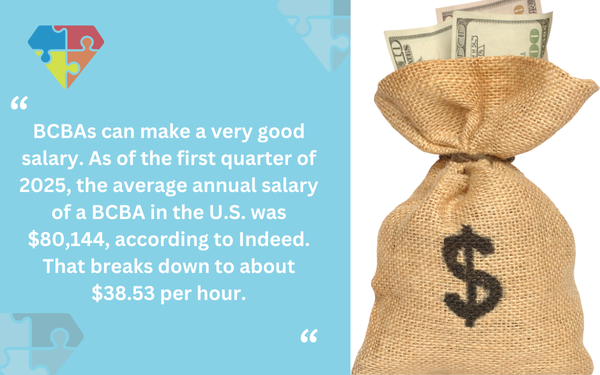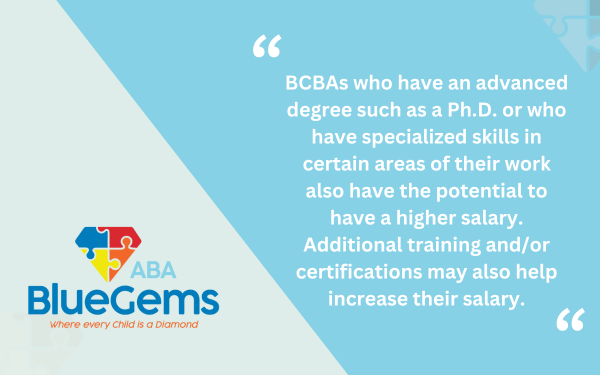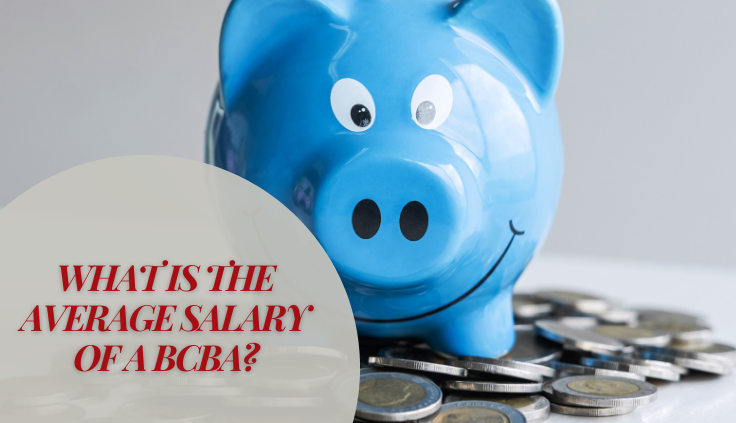What is the Average Salary of a BCBA?
Many people who work in the field of behavioral analysis desire to one day become a Board Certified Behavior Analyst (BCBA). Obtaining this certification through the Behavior Analyst Certification Board (BACB) takes years of schooling and supervised fieldwork, as well as successfully passing an examination.
A major reason why becoming BCBA-certified is so appealing is that doing so opens up a lot of career possibilities, as well as the potential to earn a high salary. Money isn’t the only motivating factor for becoming a BCBA, of course, but it’s certainly a good benefit — especially considering the significant financial investment it takes to obtain the certification in the first place.
So, how much can a BCBA earn? Below, we’ll discuss the average salary of a BCBA, as well as some of the potential jobs you could hold and locations at which you could work.
Table Of Contents
What is the Average Salary of a BCBA?
BCBAs can make a very good salary. As of the first quarter of 2025, the average annual salary of a BCBA in the U.S. was $80,144, according to Indeed. That breaks down to about $38.53 per hour.

Just like most other jobs, where you work in the country plays a big role in that salary. For instance, ZipRecruiter reports that some salaries they’ve seen have reached more than $150,000, while others have dipped as low as about $48,000.
By contrast, Registered Behavior Technicians (RBTs) have an average annual salary of $47,135, or about $22,66 per hour. This is a big step-down from the average salary for BCBAs, which shows just how much extra earning potential this that people have when they gain BCBA certification.
What Factors into a BCBA’s Salary?
A number of factors can influence what a BCBA’s salary might be.
As mentioned above, location is a primary factor. The salary for BCBAs is typically higher in areas with higher cost-of-living, as well as where BCBAs are in big demand.
BCBAs who have an advanced degree such as a Ph.D. or who have specialized skills in certain areas of their work also have the potential to have a higher salary. Additional training and/or certifications may also help increase their salary.

Another major factor in a BCBA’s salary is where they work. Typically speaking, private sector employment pays more than having a job in the public sector. That being said, public sector employment may provide better benefits such as health care, retirement savings and potentially even a pension.
What Jobs Can a BCBA Hold?
Many BCBAs will hold a position working in ABA therapy. Much of this is due to the fact that this is the sector where they are often in the highest demand — due to many states requiring that insurance companies cover ABA therapy treatment for individuals with autism spectrum disorder (ASD).
There are many different positions that a BCBA can hold within this sector, though. They could be entry-level BCBAs who manage small teams and a few patients, or they could be senior managers or even clinic directors who oversee entire ABA therapy programs.
BCBAs can work in both private sector settings such as hospitals, clinics and other healthcare settings, or they could work in the public sector such as at public schools. In all these roles, they will serve similar purposes in creating, administering and managing ABA therapy for clients.
There are also some more non-traditional jobs that a BCBA can get as well.
This includes helping to treat substance use disorders, working in occupational safety, or even in law enforcement settings such as forensics to help identify patterns in crimes or as a profiler for organizations such as the FBI.
Blue Gems ABA Supports Children with ASD
BCBAs can make a good salary, which is a big benefit of putting in the work to earn the certification. Once you have become a BCBA, you will have plenty of options for jobs, both in the private sector and the public sector.
At Blue Gems ABA, we have a great team of BCBAs who lead our ABA therapy program, supporting children with ASD through our treatment plans. Our BCBAs help patients gain the social and communication skills that they often struggle with, while also learning to modify any negative and/or harmful behaviors they may exhibit.
To learn more, please contact us today.










